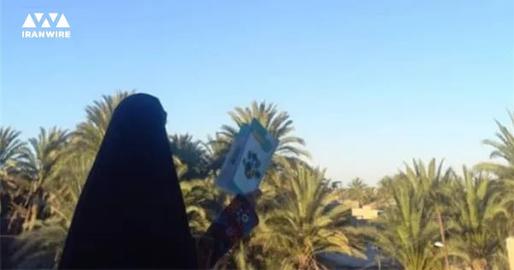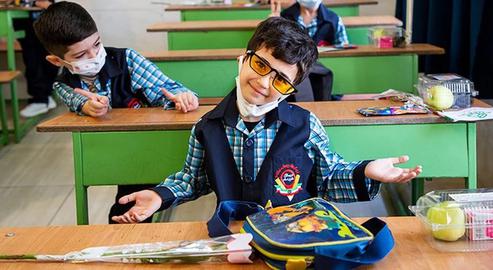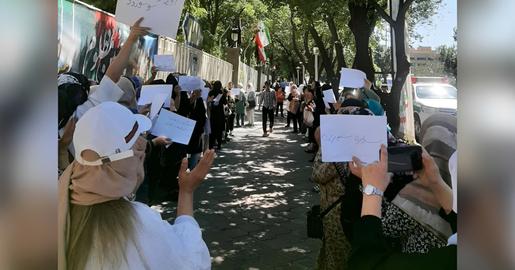“All my grades are 20s [the highest grade in Iran’s education system]. I couldn’t breathe when they told me I couldn’t go to school. The teachers and the school staff tried hard to keep me; they were all crying when they found out I had to stop coming.”
After the 2022 Nowruz holidays they told me that I wasn’t allowed to go to school anymore. Among my eight siblings I was the only one who was able to go to school after a lot of efforts and pleading.”
Ameneh Yar Mohammad-Zehi is 17, the daughter of a Pakistani father and an Iranian mother who lives on the border with Pakistan. She was the only one of eight siblings who managed to get to school at all. All that changed after the 2022 Nowruz holidays, when she barred from entering 10th grade because she had no National ID code.
Throughout our conversation she cried. Her voice trembled. She apologized over and over, and begged for help that she might be allowed to take the end-of-year exams.
An Iranian former MP has claimed about a million citizens have no ID code. More than 400,000 of them are children, of which 4,500 live in the deprived province of Sistan and Baluchistan.
***
“After I turned seven, I was eager to go to school,” Ameneh Yar Mohammad-Zehi told IranWire. “I’d watched my cousins go to school; they had books and studied, and I really wished I could read something, learn and have books like they did.
“One day I told my family that I wanted to go to school. They said I couldn’t because they knew I had no ID. May mother told me to go to the religious school instead, because they didn’t require one. I asked her to let me go to school with my cousin for just one day, just to see what it was about, even if they refused to register me. At last, one day, I did. I had a great time. I’ll never forget that day.”
When it came to registration, she said, “I went to the principal’s office and spoke with the principal and the teachers. They asked me about my situation; my parents weren’t there. I told them I had no ID but I’d loved coming to school. They felt I was talented and wanted to have me at the school, so they told me to come without registering.”
After a week, Ameneh’s first-grade teacher and principal felt confident in keeping her in the classroom. They and others were aware that the Ministry of Education had issued a decree saying children who had no ID, but who did have a birth certificate, could study up until 9th grade. “I felt that the was mine,” Ameneh said. “Everybody was happy to see me there.”
She attended school for six years in total. “The teachers helped me every step of the way,” she said. “They paid my expenses because my family couldn’t afford to pay anything. In the first five of those six years, my family kept asking me, ‘Why are you going to school? You wont’s get anywhere; you have no ID and you can’t finish.’”
When the coronavirus pandemic started, Ameneh’s teachers pooled resources and bought her a mobile phone so she could keep attending classes digitally. With great passion, she spoke of the competitions she took part in remotely: she received an honorable mention in a painting contest in Fars province, and studied elocution, presentation and reporting online in order to present the awards at school ceremonies. She taught other students about media and culture activities. Also remotely, she won a prize in a Tehran calligraphy contest.
Then, when the new school year began, Ameneh was told she couldn’t stay. “I didn’t know what to do,” she said. “At home I just cried and cried.”
Reverberations of a Sexist Law
In October 2019, after more than a decade of pressure from activists, Iran’s Guardian Council finally approved an amendment that would grant Iranian citizenship to the children of Iranian women married to foreign men. The amended law, however, is still a far cry from outright equality: for one thing, Iranian women have to apply for nationality for their children, while the children of Iranian men are granted it nationality automatically. Children who turn 18 can apply for citizenship themselves.
The Bureau for Aliens and Foreign Immigrants Affairs also cannot independently issue an ID for these children. The amended law also requires the Intelligence Ministry and the Revolutionary Guards’ Intelligence Organization (IRGC-IO) to independently certify there will be no “security problem” in doing so. Then, after an application is rubber-stamped, it has to go before a court.
Lack of ID poses serious problems for many residents of Iranian border provinces, not least when it comes to education. Those without a birth certificate, if their families have the resources to let them study, have no option but to go down the religious route.
Life After School
Now at 17, Ameneh is a kindergarten instructor, having passed a one-week course offered by Khorasan province with perfect scores. She has since opened a kindergarten in her own city and is training other early years professionals herself: 180 to 200, by her count.
Before her high school education was taken away from her, Ameneh had wanted to become an Arabic teacher and planned to pursue literature and the humanities. She and her mother even went to the local government office, filled out forms and were fingerprinted to obtain an ID code for her. But the application was never processed. In the meantime, the Education Ministry informed schools in the area that any pupil present without an ID was there illegally.
“When I heard this news I almost had a heart attack,” Ameneh said, bursting into tears. “Even now it’s difficult for me to describe how I felt during those days.” A friend of hers was expelled for the same reason and since then, her family have forced her to marry.
visit the accountability section
In this section of Iran Wire, you can contact the officials and launch your campaign for various problems
























comments